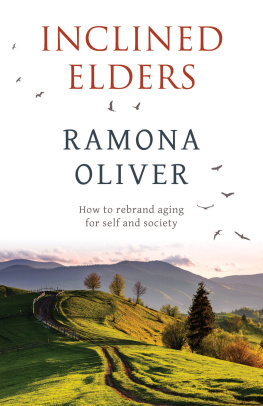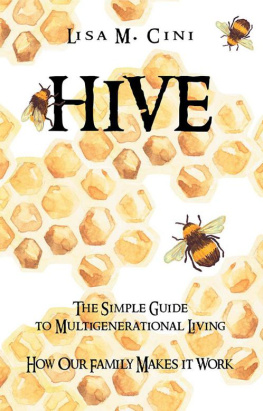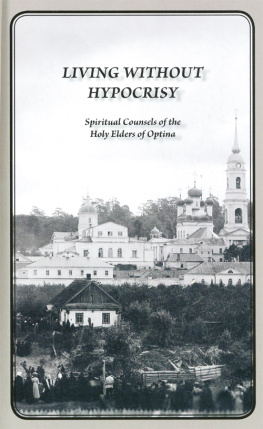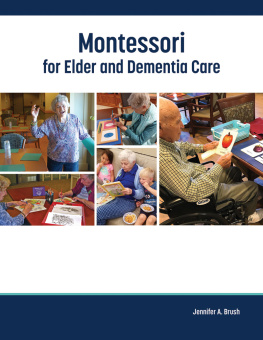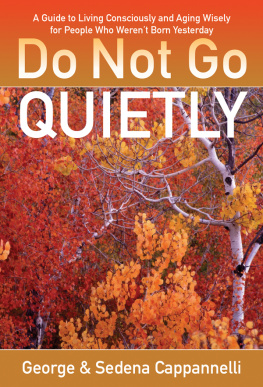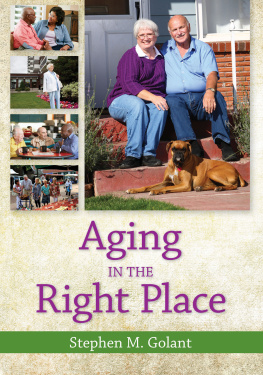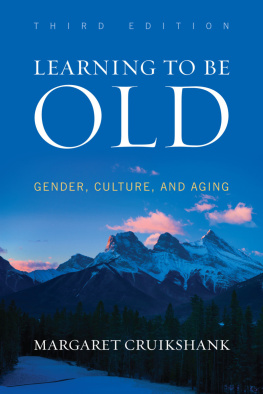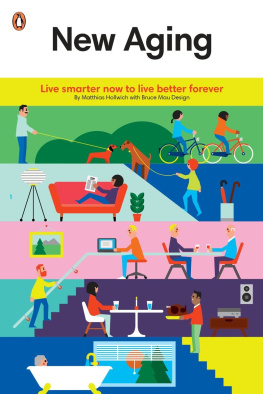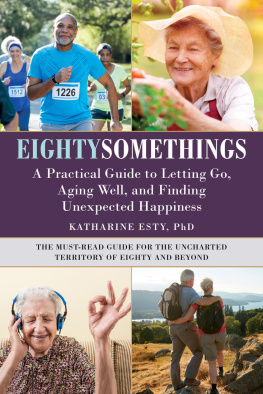Aging Our Way
Aging Our Way
Lessons for Living from 85 and Beyond
Meika Loe


Oxford University Press, Inc., publishes works that further
Oxford Universitys objective of excellence
in research, scholarship, and education.
Oxford New York
Auckland Cape Town Dar es Salaam Hong Kong Karachi
Kuala Lumpur Madrid Melbourne Mexico City Nairobi
New Delhi Shanghai Taipei Toronto
With offices in
Argentina Austria Brazil Chile Czech Republic France Greece
Guatemala Hungary Italy Japan Poland Portugal Singapore
South Korea Switzerland Thailand Turkey Ukraine Vietnam
Copyright 2011 by Oxford University Press
Published by Oxford University Press, Inc.
198 Madison Avenue, New York, New York 10016
www.oup.com
Oxford is a registered trademark of Oxford University Press.
All rights reserved. No part of this publication may be reproduced,
stored in a retrieval system, or transmitted, in any form or by any means,
electronic, mechanical, photocopying, recording, or otherwise,
without the prior permission of Oxford University Press.
Library of Congress Cataloging-in-Publication Data
Loe, Meika, 1973
Aging our way : lessons for living from 85 and beyond / Meika Loe.
p. cm.
Includes bibliographical references and index.
ISBN 978-0-19-979790-5 (cloth : alk. paper) 1. AgingSocial aspects.
2. Older peoplePsychology. 3. Older peopleHealth and hygiene. 4. Quality of life.
5. Well-being. I. Title.
HQ1061.L59 2011
646.700846dc22 2011008731
1 3 5 7 9 8 6 4 2
Printed in the United States of America
on acid-free paper
To Levi, who comes from a long line of phenomenal women
CONTENTS
ACKNOWLEDGMENTS
I want to thank the thirty inspirational elders who make this book what it is. Some taught me about conquering loneliness, some tutored me in Yiddish, some served me shortcake, and others served as editors. All reminded me of the importance of living purposeful lives, and their lessons live on.
Their voices are made that much richer by those who assisted with this books preparation. Students of all ages patiently listened to ideas and excerpts early on, and offered encouraging feedback and support, including Colgate University and Skidmore College students who have taken my Sociology of the Life Course class, as well as Colgates Lifelong Learners, Skidmores Mature Adults, and Hunter College Alumni in the Capital Region. Special thanks go to student research assistants Rachel Greenburg and Katherine Flynn.
Many colleagues and friends took time to provide thorough and thoughtful feedback. Special thanks go to Toni Calasanti, Deborah Carr, Kelly Joyce, and several anonymous reviewers for believing in this project and giving it strength. Eliza Kent spent many hours in cafes reading drafts and providing invaluable guidance. Carol Bergens news clippings and questions over breakfast kept me grounded. Laura Carpenters and Jennifer Reichs support and encouragement never wavered. Thank you to Janel Benson, Courtney Burke, Rebecca Costello, Carolyn Kissane, Karen Luciani, and Crystal Moore, for your constructive feedback. Thanks as well to the Oxford team and James Cook, who carefully read every word of the manuscript, cut a few, and deftly shepherded it through.
I am indebted to the organizations that directly supported this project, specifically the Upstate Institute at Colgate University and the Institute on Research on Women at University at Albany. The project was strengthened with encouragement from Bill Thomas and Jude Rabig and Eldershire workshop participants; Erin Mitchell at AARP; Loretta Carney of Albany Fortnightly; Sue Kenneally and Rick Ianello of the Albany Guardian Society; Kim Hansen Woods at Albany Senior Housing; Bethany Meade, Laurie Milward, and Nikki Smith from Albany Senior Services from Albany Senior Services; Laurie Mante, Maryclaire Hassett, Libby Kesner, Liza McKinley, and Kris Santaromita of Eddy Village Green; Amy Vastola of Jewish Family Services; Sue Baumann and Steven Spiller at Madison Lane Apartments; Courtney Burke of the Rockefeller Institute; Lois Wilson of Senior Issues Forum; Claire Sigal and Dick Allen at the Sidney Albert Albany Jewish Community Center; Julie Meyer at the U.S. Census Bureau; Tanya Zelman of the West Hill Neighborhood Health Advocate Program; and the lifelong learners and researchers at Fortnightly Club of Hamilton, Thursday Morning Club of Troy, and Fortnightly Club of Albany.
We are all a product of our time and place. That could not be more true in my case. Heartfelt thanks to my Lancaster Street family and my Hamilton community, two places I call home and the initial inspiration for this book. That said, my life is made most meaningful by my New York, Colorado, and California families. On a daily basis, they model the most important lessons for living, and keep me accountable.
PROLOGUE
306090: ON AGE AND PERSPECTIVE
30. When I turned thirty, I felt old. I felt experienced, grounded, and honestly, more legitimate. I was an assistant professor with several years of teaching and a book under my belt. I was a decade older than my students. Fewer people asked me if I was a student or what I was majoring in. Then I rented a room in an elders home near the university and discovered a thriving elder community. Over the next three years, as I taught courses on aging, started a family, and resided in two vibrant intergenerational communities, elders became my primary teachers, mentors, friends, and extended family. Experiencing pregnancy and childbirth within these communities, I began to embrace the complexities of age, wrapped up in questions about body, health, culture, social perception and roles, generations, life stages, location, and relationships. Meanwhile, I came to view aging and the human life course in new ways. I realized the importance of social networks, continuity across ones life, and self-reliance and control when it comes to well-being and living, aging, birthing, and dying comfortably. In sum, I have been busy rethinking age.
60. My parents and in-laws are in their sixties. Each actively loves and cares for their surviving parents, children, and grandchildren, most of whom live at a distance. At moments, tables turn, and those who cared for us look to us for care. I see them balancing their adult lives with new and emerging issues. Their lives and bodies, roles and responsibilities are in flux. Reminders of aging that had previously remained under the surface are emerging. All have dealt with loss and grieving and serious health issues, and all have taken advantage of senior discounts. Yet, they prefer not to refer to themselves as seniors, and are not even remotely considering moving to Florida. Instead, what lies before them is time, new family configurations, and opportunities for reinvention. They are rethinking age.
90. We have longevity in the family, as they say. My fathers mother lived to ninety, and her mother lived to ninety-two. My mothers father just turned ninety. My grandparents and great-grandparents long lives enabled me to learn from them and enjoy their company well into adulthood. My grandparents have been among my most trusted lifelong companions, friends, and mentors. We have watched and supported each other over the years. I have observed them confronting physical challenges associated with longevity. I have asked questions about living meaningful lives in old age, and they have raised issues related to independence, safety, companionship, care, and mortality. In many ways, their questions have become my questions, and have led me to the thirty oldest old who anchor this book.



